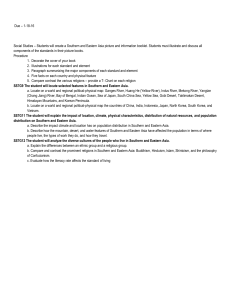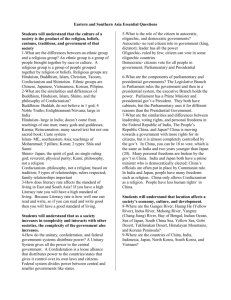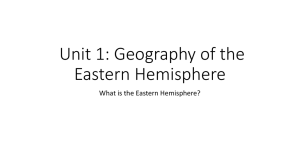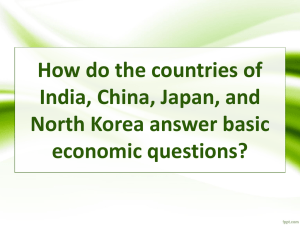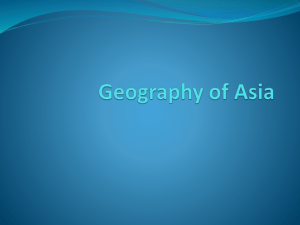7th Grade Unit 5
advertisement
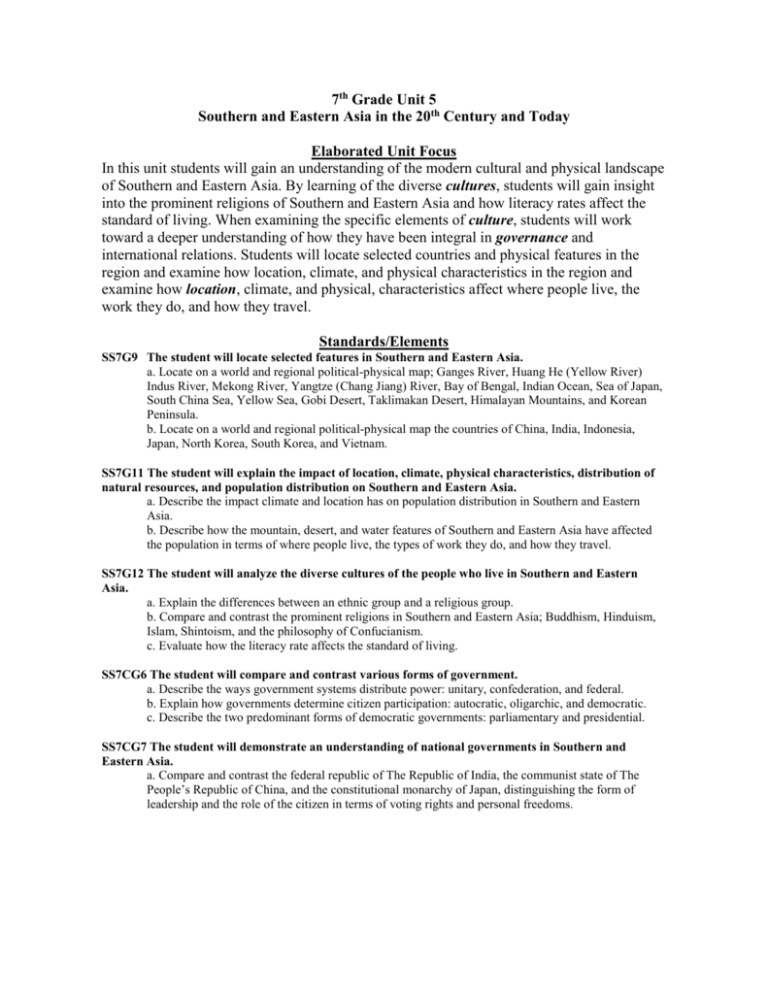
7th Grade Unit 5 Southern and Eastern Asia in the 20th Century and Today Elaborated Unit Focus In this unit students will gain an understanding of the modern cultural and physical landscape of Southern and Eastern Asia. By learning of the diverse cultures, students will gain insight into the prominent religions of Southern and Eastern Asia and how literacy rates affect the standard of living. When examining the specific elements of culture, students will work toward a deeper understanding of how they have been integral in governance and international relations. Students will locate selected countries and physical features in the region and examine how location, climate, and physical characteristics in the region and examine how location, climate, and physical, characteristics affect where people live, the work they do, and how they travel. Standards/Elements SS7G9 The student will locate selected features in Southern and Eastern Asia. a. Locate on a world and regional political-physical map; Ganges River, Huang He (Yellow River) Indus River, Mekong River, Yangtze (Chang Jiang) River, Bay of Bengal, Indian Ocean, Sea of Japan, South China Sea, Yellow Sea, Gobi Desert, Taklimakan Desert, Himalayan Mountains, and Korean Peninsula. b. Locate on a world and regional political-physical map the countries of China, India, Indonesia, Japan, North Korea, South Korea, and Vietnam. SS7G11 The student will explain the impact of location, climate, physical characteristics, distribution of natural resources, and population distribution on Southern and Eastern Asia. a. Describe the impact climate and location has on population distribution in Southern and Eastern Asia. b. Describe how the mountain, desert, and water features of Southern and Eastern Asia have affected the population in terms of where people live, the types of work they do, and how they travel. SS7G12 The student will analyze the diverse cultures of the people who live in Southern and Eastern Asia. a. Explain the differences between an ethnic group and a religious group. b. Compare and contrast the prominent religions in Southern and Eastern Asia; Buddhism, Hinduism, Islam, Shintoism, and the philosophy of Confucianism. c. Evaluate how the literacy rate affects the standard of living. SS7CG6 The student will compare and contrast various forms of government. a. Describe the ways government systems distribute power: unitary, confederation, and federal. b. Explain how governments determine citizen participation: autocratic, oligarchic, and democratic. c. Describe the two predominant forms of democratic governments: parliamentary and presidential. SS7CG7 The student will demonstrate an understanding of national governments in Southern and Eastern Asia. a. Compare and contrast the federal republic of The Republic of India, the communist state of The People’s Republic of China, and the constitutional monarchy of Japan, distinguishing the form of leadership and the role of the citizen in terms of voting rights and personal freedoms. Vocabulary Focus Climate- __________________________________________________________________________________ __________________________________________________________________________________________ Location-__________________________________________________________________________________ __________________________________________________________________________________________ Ethnic Group- _____________________________________________________________________________ __________________________________________________________________________________________ Religious Group- ___________________________________________________________________________ __________________________________________________________________________________________ Buddhism- ________________________________________________________________________________ __________________________________________________________________________________________ Hinduism- ________________________________________________________________________________ __________________________________________________________________________________________ Islam- ____________________________________________________________________________________ __________________________________________________________________________________________ Shintoism- ________________________________________________________________________________ __________________________________________________________________________________________ Confucianism- _____________________________________________________________________________ __________________________________________________________________________________________ Literacy Rate- ______________________________________________________________________________ __________________________________________________________________________________________ Standard of Living- _________________________________________________________________________ __________________________________________________________________________________________ Unitary- __________________________________________________________________________________ __________________________________________________________________________________________ Confederation- _____________________________________________________________________________ __________________________________________________________________________________________ Federal- __________________________________________________________________________________ __________________________________________________________________________________________ Autocratic- ________________________________________________________________________________ __________________________________________________________________________________________ Oligarchic- ________________________________________________________________________________ __________________________________________________________________________________________ Democratic- _______________________________________________________________________________ __________________________________________________________________________________________ Parliamentary Democracy- ___________________________________________________________________ __________________________________________________________________________________________ Presidential Democracy- _____________________________________________________________________ __________________________________________________________________________________________ Enduring Understandings/Essential Questions Students will understand that the culture of a society is the product of the religion, beliefs, customs, traditions, and government of that society. What are the differences between an ethnic group and a religious group? ________________________ __________________________________________________________________________________ __________________________________________________________________________________ __________________________________________________________________________________ What are the similarities and differences of Buddhism, Hinduism, Islam, Shinto, and the Philosophy of Confucianism? ______________________________________________________________________ __________________________________________________________________________________ __________________________________________________________________________________ __________________________________________________________________________________ __________________________________________________________________________________ __________________________________________________________________________________ How does literacy rate affect the standard of living in East and South Asia? ______________________ __________________________________________________________________________________ __________________________________________________________________________________ __________________________________________________________________________________ Students will understand that as a society increases in complexity and interacts with other societies, the complexity of the government also increases. How do the unitary, confederation, and federal government systems distribute power? _____________ __________________________________________________________________________________ __________________________________________________________________________________ __________________________________________________________________________________ __________________________________________________________________________________ __________________________________________________________________________________ __________________________________________________________________________________ What is the role of the citizen in autocratic, oligarchic, and democratic governments? ______________ __________________________________________________________________________________ __________________________________________________________________________________ __________________________________________________________________________________ __________________________________________________________________________________ __________________________________________________________________________________ What are the components of parliamentary and presidential governments? ______________________ __________________________________________________________________________________ __________________________________________________________________________________ __________________________________________________________________________________ __________________________________________________________________________________ __________________________________________________________________________________ What are the similarities and differences between leadership, voting rights, and personal freedoms in the Federal Republic of India, The People’s Republic of China, and Japan? ______________________ __________________________________________________________________________________ __________________________________________________________________________________ __________________________________________________________________________________ __________________________________________________________________________________ __________________________________________________________________________________ __________________________________________________________________________________ __________________________________________________________________________________ Students will understand that location affects a society’s economy, culture, and development? Where are the Ganges River, Huang He (Yellow River) Indus River, Mekong River, Yangtze (Chang Jiang) River, Bay of Bengal, Indian Ocean, Sea of Japan, South China Sea, Yellow Sea, Gobi Desert, Taklimakan Desert, Himalayan Mountains, and Korean Peninsula? Label these on your map!!!!!!! Where are the countries of China, India, Indonesia, Japan, North Korea, South Korea, and Vietnam? Label these on your map!!!!!!! What is the impact of climate and location on population distribution in Southern and Eastern Asia? __________________________________________________________________________________ __________________________________________________________________________________ __________________________________________________________________________________ __________________________________________________________________________________ __________________________________________________________________________________ __________________________________________________________________________________ __________________________________________________________________________________ How do the mountain, desert, and water features of Southern and Eastern Asia affect the population in terms of where people live, the types of work they do, and how they travel? _____________________ __________________________________________________________________________________ __________________________________________________________________________________ __________________________________________________________________________________ __________________________________________________________________________________ __________________________________________________________________________________ __________________________________________________________________________________ __________________________________________________________________________________
